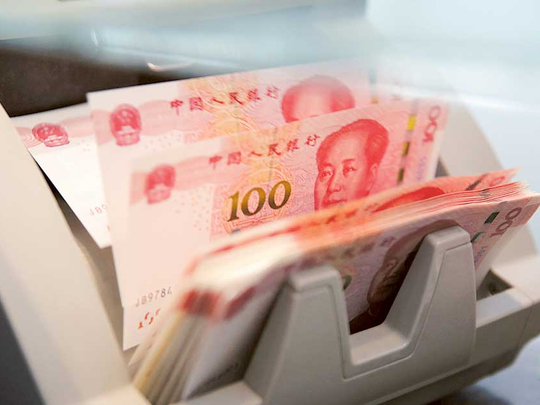
Dubai: Renminbi (RMB) is fast emerging as trading currency of choice among the UAE based businesses, according a study by HSBC Commercial Banking.
Nearly half of businesses (49 per cent) surveyed in the UAE forecast that the RMB will become an international trading currency in the next 5 years, up 5 per cent from 2015.
In the poll of 1,600 decision-makers across 14 countries, the UAE’s increased confidence in the future of the currency places it just third after China and Taiwan.
The RMB Internationalisation Study by HSBC showed that there has been a noticeable increase in UAE businesses who intend to use RMB in their international business in future — rising from 34 per cent in 2015 to 46 per cent this year. Primary drivers for this increase are reducing foreign exchange risk or costs, and cheaper pricing.
The survey also found that current RMB users among businesses in the UAE has actually dropped 60 per cent — from 10 per cent in 2015, to 4 per cent this year. Many UAE businesses expressed hesitation to change existing contracts, concern about unclear regulations for using RMB, and the uncertainty of the Chinese policy on RMB exchange rate, as well as other counterparts unwilling to trade in the currency as the main reasons for their current reluctance to use the currency.
Globally, 80 per cent of HSBC survey respondents (92 per cent in the UAE) believe that future import/export trading continues to be the most common RMB transaction. In the UAE, 60 per cent of businesses believe trade financing is also likely to be a key transaction when using RMB.
“It is evident from this Study that businesses are interested to gain more knowledge and understanding to be able to engage the RMB as a working currency. Banks have an important role in sharing more information on the wider tangible benefits that can be gained beyond import / export transactions so that a wider portfolio of transactions can be undertaken in RMB,” said Kyle Boag, Regional Head of International Subsidiary Banking for HSBC MENA
As Chinese financial regulations evolve, and as businesses become more accustomed to using China’s currency, respondents (globally) said that compared to previous years, they are having less difficulty understanding regulations, navigating documentary requirements and moving funds than they did in the past. Furthermore, businesses are facing fewer challenges from their counterparts when using RMB.
On the Belt and Road initiative, the Chinese government’s $6 trillion investment to boost cross-border commerce and capital flows, more companies in the UAE (50 per cent) were aware of the opportunities than those in Europe (22 per cent) and North America (18 per cent). Despite the high level awareness of the opportunities related to Belt and Road projects, only 8 per cent of these UAE companies have started developing strategies to benefit from these initiatives.












